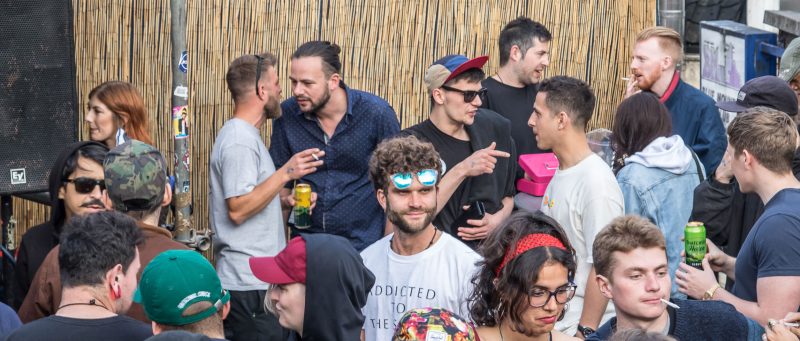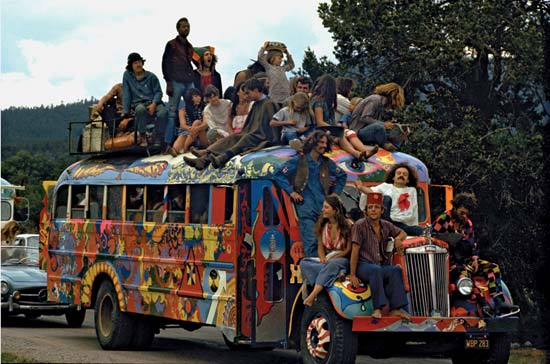“Punk is dead!” sang Crass in 1978. Lead singer Steve Ignorant was complaining that punk had sold out. The values of punk – of anarchism and working-class revolution – were subverted in the idea that the ‘big time promoters’ had taken control. The rules of punk had been broken and therefore, to Crass, the subculture was dead.
Whether you agree that punk is dead or not, the statement brings something to light. I’m not talking about the decline of punk subculture, but the actual idea of ‘subcultures’ in general…
*…the entire underground music scene takes a big breath…*
“But subcultures are everywhere! Drum & bass is a subculture! What about Hip Hop? What about post-industrial Icelandic cyberpunk?! How can you say this?!? Scoundrel! HERETIC! @#!&?£!!!!”…okay, okay. I’m not claiming that subcultures are dead dead, but I do want to draw attention to the fact that the concept as it was originally imagined has become sociologically outdated.
Let me explain what I mean. Early theory on UK subculture was developed by the Birmingham Centre for Contemporary Cultural Studies (CCCS) in the 70’s and 80’s. They described social sub-groups that formed against the grain of ‘mass culture’ after post-WWII consumerism allowed young people to deviate from their previously restrictive class-based identities and re-define themselves in groups of their choosing. People were suddenly free to self-construct identities, creating communities that reflected their personal belief systems more accurately than wider society did. Glancing over history, many memorable subcultures developed over the decades. Mods, rockers, beatniks, punks, hippies, goths – all easily recognisable and tirelessly stereotyped. But why are there so few modern subcultures that are this easy to identify?
‘Subculture’ denotes a fixed identity and set of values (you couldn’t be a mod AND a rocker). This may have seemed the case in the 70s, but today our social lives seem more multi-faceted and promiscuous. As such, the boundaries that distinguish subcultures have become more and more blurred. To explore this, let’s consider what characterises the people of drum & bass culture today. How can you tell someone is part of this culture without them having to tell you?

The reason this is difficult is that not all of us subscribe to a ‘drum & bass’ lifestyle all of the time (whatever that is). Yes, I consider myself a member of this culture, but I wouldn’t define my entire social identity by it. I’m not a ‘D&B head’ when I visit my grandma. Or when I go to a book club, or a jazz gig. This is something that was largely overlooked by CCCS research – our socio-cultural identities are much more fluid than previously thought.
Here comes a pretentious word: neo-tribalism. My guy Michel Maffesoli (in his seminal 1996 work The Time Of The Tribes) used this term to conceptualise the breaking down of societal structures in a postmodern era of plurality. That is, we now belong to many different social groups (tribes) and reconstruct our social identities for each as we flit between them.
Think of the concept of ‘subculture’ as a row of restaurants you’re choosing between. You choose Indian and enjoy a delicious evening of poppadoms and jalfrezi. You’ve subscribed to one restaurant (subculture) with one easily defined menu (set of values): this is how the CCCS viewed youth subcultures. Matey boy Maffesoli sees it more like a world-food buffet. You can enjoy your jalfrezi at one moment, munch through some lasagne and then dip into a bit of goulash the next. You chop and change, each time redefining your taste (tribal identity) with each cuisine (tribe) you choose.
So at a drum & bass event, I adopt my ‘D&B head’ persona. At my monthly book club, I adopt my ‘book nerd’ persona. We can choose to engage and develop our differentiated personas for each ‘tribe’ we subscribe to without having to conform to a single, unified subculture. The clearer distinctions between subcultures of the past could be explained by inadequate research (what else did punks do? How did they act around their grandmas? Maybe they were more ‘neo-tribal’ than they seemed), or perhaps the social climate of today has become assimilated into singularity by the Internet. Maybe the ‘subcultural’ phase was preliminary to the ‘neo-tribal’ phase, or the motives behind subcultural evolution have shifted from resistance (as with punks and hippies) to more pick-up/put-down trends. I have no idea – but the degradation of clearly defined subcultures is noticeable, for sure.

If I have bruised your subcultural ego, don’t worry. This idea shouldn’t demote your identity – in fact, I find the idea pretty liberating. Our D&B tribe still feels coherent and binds us together in a really positive way; all I’m trying to say is that your D&B cultural identity (if you have one) is one of many that makes up the rich tapestry of ‘you’. We each feel our D&B persona contributing to our identities differently, and when we do choose to tap into that tribal part of ourselves by going to a rave together, that’s when we feel the commonality, the ‘togetherness’, the subculture – manifested by dancing around to the music we love. Research tells us that our ‘rave’ communities are bound less by a specific genre of music and more by the experience: sharing emotions, immediacy and consumption practices. Behaviours of trance music fans at their events are essentially the same as fans of drum & bass music. It’s the community that attracts us, the shared interest of D&B acting purely as a vehicle for us to get together in a room, socialise and dance. The genre doesn’t embody the belief system, the ritual does.
This all sounds very tribal indeed, but the binding together of groups through ritual is something we have pretty much evolved alongside and is still very much observable in our modern-day lives. Pre-drinks before the club? That’s a ritual, yo. It can be difficult to think of the things we do today as ‘ritualistic’, but they absolutely are. A group of people synchronised and dancing to the repetitive rhythms of a beat, using their collective experience to connect and reach something ‘higher’… Am I describing a rite of passage ritual of the African Ndembe tribe or Fabric room 2?
Yes, we all like the idea of belonging to a subculture, but I feel our approach needs recalibrating. If anything, the fluid nature of this neo-tribal view on society is an open door for cultural experimentation. We don’t have to sacrifice anything to dip into another tribe’s way of doing things, to wear another tribesman’s shoes. The homogeny of the ‘subculture’ is replaced by the diversity of inter-tribal social butterflies and, at the root of it, it’s this level of empathic engagement that truly helps us to understand each other and build stronger social bonds.
Maffesoli, M. (1996) The Time of the Tribes: The Decline of Individualism in Mass Society. London: SAGE Publications Ltd.
Header photo: Alexander Dluzak







